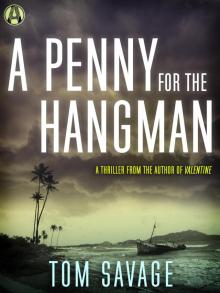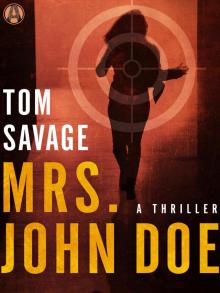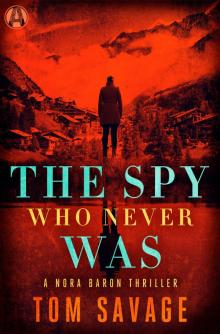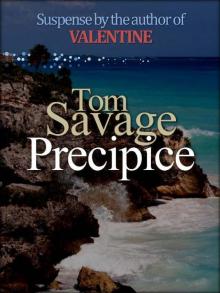- Home
- Tom Savage
Mrs. John Doe
Mrs. John Doe Read online
Mrs. John Doe is a work of fiction. Names, places, and incidents either are products of the author’s imagination or are used fictitiously. Any resemblance to actual events, locales, or persons, living or dead, is entirely coincidental.
An Alibi eBook Original
Copyright © 2015 by Tom Savage
All rights reserved.
Published in the United States by Alibi, an imprint of Random House, a division of Penguin Random House LLC, New York.
ALIBI is a registered trademark and the ALIBI colophon is a trademark of Penguin Random House LLC.
eBook ISBN 9781101884751
Cover design: Caroline Teagle
Cover image: © Ilona Wellman/Arcangel Images
readalibi.com
v4.1
ep
Contents
Cover
Title Page
Copyright
Epigraph
Chapter 1
Chapter 2
Chapter 3
Chapter 4
Chapter 5
Chapter 6
Chapter 7
Chapter 8
Chapter 9
Chapter 10
Chapter 11
Chapter 12
Chapter 13
Chapter 14
Chapter 15
Chapter 16
Chapter 17
Chapter 18
Chapter 19
Chapter 20
Chapter 21
Chapter 22
Chapter 23
Chapter 24
Chapter 25
Chapter 26
Chapter 27
Chapter 28
Chapter 29
Chapter 30
Chapter 31
Chapter 32
Chapter 33
Chapter 34
Chapter 35
Chapter 36
Chapter 37
Chapter 38
Chapter 39
Chapter 40
Chapter 41
Chapter 42
Chapter 43
Chapter 44
Chapter 45
Chapter 46
Chapter 47
Chapter 48
Chapter 49
Chapter 50
Dedication
Acknowledgments
About the Author
LADY MACDUFF. Whither should I fly?
I have done no harm. But I remember now
I am in this earthly world, where to do harm
Is often laudable, to do good sometime
Accounted dangerous folly. Why then, alas,
Do I put up that womanly defence
To say I have done no harm?
[Enter murderers.]
What are these faces?
FIRST MURDERER. Where is your husband?
LADY MACDUFF. I hope, in no place so unsanctified
Where such as thou mayst find him.
—William Shakespeare, Macbeth (act IV, scene II)
Chapter 1
She was standing on the widow’s walk when the call came. It was an appropriate place to be, all things considered, but Nora Baron didn’t usually think in terms of irony. Only later would she see the awful humor in it.
She and Jeff used to spend a lot of time up here when they first moved in twenty-one years ago. Cocktails at sunset, gazing out at Long Island Sound as it slowly darkened, chatting about their day at work before going downstairs, hand in hand, to the dinner she’d proudly prepared for them. They had a party up here once, a spring afternoon, with two of her colleagues from Stony Brook University and one of his from the electronics business. Otherwise, it was always just family, enjoying their private sanctuary at the top of the house. Nude sunbathing! Well, only a couple of times, that first summer when they were still officially newlyweds, and never after Dana was born. More recently, Dana came up here with her friends from college. Nora hoped they kept their clothes on.
Thinking of her daughter brought a smile. Dana had turned twenty in February, and she’d just completed her sophomore year. She was at NYU, not Stony Brook; she’d chosen the theater department at Nora’s alma mater over the university where Nora was now an acting teacher. But she was following Nora to the footlights just the same, another actor in the family.
A breeze from the Sound ruffled her hair, and Nora grasped the wooden railing that ringed the platform and leaned into the sunset. She loved the fresh, salty tang of the open water, the perfume of her sunburned youth. She’d been for a swim earlier, while Mrs. Ramirez was cleaning, and there’d been quite a few neighbors about, lounging and jogging. Nora had plenty of time to swim these days, with Jeff working in England and Dana now living in Greenwich Village, and no classes to teach until September. It wasn’t even July yet.
The sky above the water was the deep, almost shocking shade of late afternoon blue that always filled her with a sense of contentment. There was no one on the beach beyond the grassy dunes at this hour, only two seagulls pecking in the sand near the water’s edge. Well, the smaller one was pecking, foraging for food, while the larger one circled it, hopping up and down and squawking. As she watched, a big wave crashed near the birds, startling them. They took off with angry cries and a flurry of wings, skittering away down the shore…
And the telephone rang.
It was the landline in the bedroom below her. Her cell was in her pocket; her daughter had programmed it to blare a rousing chorus of Ethel Merman shrieking “There’s No Business Like Show Business” whenever anyone called. The cellphone was pretty much family only, so this caller wouldn’t be Jeff or Dana. She went over to the roof door and down the narrow staircase to the upstairs hallway.
As she entered the master bedroom, she noted with approval that Mrs. Ramirez had changed the sheets and vacuumed. The mirror above her dresser gleamed from the Windex, reflecting a tall, slender woman of Irish descent with nice green eyes, good cheekbones, and shoulder-length chestnut hair. The color was professionally applied, hiding many gray strands; she wasn’t yet ready to admit that she was closing in on fifty. The slenderness was due to all the swimming, and to yoga and Pilates, not to mention overseeing armies of boisterous students. She sat on the bed and picked up the phone from the night table. “Hello?”
The mild static suggested an overseas call, even before she heard the plummy accent and cultured tones of her husband’s British business associate.
“Nora, it’s Bill Howard.”
“Hi, Bill! How nice to hear from you. How are you?”
A pause, then a breath. “I—I—Oh, Nora, I don’t know how to tell you this. I’m afraid I have some very bad news. Is—is anyone there with you?”
“No, I’m alone here. Why do you ask? What is it, Bill? What’s wrong?”
More ragged breathing. Then “I’m so sorry, Nora. It’s—it’s Jeff. He’s been in an accident. He’s dead.”
She heard the words, and they registered; she understood. Something happened inside her, a sudden feeling that she was on a stage and they were speaking lines that had been written by a playwright. She gripped the receiver carefully in her hand and spoke slowly, distinctly, so the audience could hear.
“How, Bill? How did it happen?”
“He was in one of my company’s cars in Kensington, on Holland Park Avenue. He seems to have swerved off the road and struck a wall. He—he was gone by the time the emergency people got to him. I’m so sorry. I’ve only just learned of it myself. It happened yesterday evening.”
“You’ve only just learned of it?” Nora was aware that she was still enunciating everything carefully. She didn’t sound like herself; she sounded like a character in the play she was performing. She wondered if this was a symptom of shock.
“Yes, that’s the odd thing about it. It seems
he didn’t have anything on him, any identifying cards or papers. Nothing in his wallet but money, and pictures of you and your daughter. The police didn’t know who he was until they traced the car to us. I—I went to the morgue and, um, identified him. I’m just now back from there.”
The woman she was playing said, “Was anyone else hurt? Was he—”
“He was alone in the car, and no other cars were involved, so far as they know. None that stopped, at any rate…”
She weighed those last six words. “What are you saying, Bill? Do they have reason to believe it was anything other than an accident?”
Bill Howard gasped; that’s how it sounded, anyway, and his voice trembled with emotion. “Oh, Nora, I don’t really know anything at this point. I think you must—you must…” He was Jeff’s longtime friend and colleague, she reminded herself, and he was floundering, apparently searching for words in his own distress.
“I’ll come,” she heard herself say. “I’ll get a seat on the soonest flight.”
Now he seemed to pull himself together, and his voice took on a clipped, authoritative tone. “Let us do that for you, Nora. My assistant can handle all the business with the flights—”
“No,” she said. “No, thank you, Bill. I must—I’d rather be doing something. I’ll call you as soon as I know when I’m arriving.”
“We’ll book you in the Savoy—”
“No, nothing big. That little place in Gower Street where we usually stay.” We. She and Jeff…
“The Byron,” Bill said. “We’ll handle that, at least. Let me know your flight, and I’ll meet you at Heathrow. I’m so very sorry, Nora.”
She winced; she would have to get used to that sentiment. “Thank you, Bill, for—for being so kind.” She hung up before he could say anything more.
The bedroom was dark now. The receiver missed the cradle on the table and fell silently to the carpet. A car accident. She’d often wondered how it would be, what news she might hear. Jeff traveled so much with his business. But she’d never thought of a car accident. A plane, maybe…
A plane. The character she was playing took over once more. Nora Baron shut her eyes for a moment and listened to the silence in her house, in her body, in her mind. Then she opened her eyes, switched on the bedside lamp, picked up the receiver from the floor, and called the airline.
Chapter 2
The man across the aisle was looking at her again. Well, it seemed that way to Nora, but she couldn’t really be certain; perhaps she was merely being vain. She glanced briefly over at him and changed her mind. No, she thought, I’m imagining it; he’s watching a movie, something with Tom Cruise, and he’s wearing earbuds. He was Hispanic or Middle Eastern, or maybe Greek; she couldn’t always pinpoint nationalities. And he was half her age, but age considerations didn’t necessarily deter males from exercising a roving eye. Here came the pretty flight attendant with the drinks cart, and now he looked up and smiled. He had no interest in Nora, whereas with the girl, he was indulging in what Jeff had always called window-shopping.
Jeff.
She rested her head back against the enormous seat and closed her eyes. She hadn’t traveled much lately, but Jeff’s constant continent hopping had apparently caused their joint airline credit account to all but glow in the dark. When she’d called them yesterday to book the round-trip ticket—Coach, please, open return—she’d immediately and cheerfully been bumped up to first-class. So, here she was, closing in on Heathrow at just about two o’clock in the afternoon, London time, dreading the ordeal ahead in impressive luxury.
She’d slept a little, and she’d eaten some of the excellent meal she’d been served, but she’d declined the offered wine and Champagne. She remembered her late mother’s adage that nerves and alcohol were never a wise combination. At least she was mercifully alone: Dana had wanted to come with, as she’d expressed it, but Dana had been denied. Nora had gone into the city to see her daughter before her flight, and they’d had a long, emotional talk in the cramped, cluttered rooms Dana was sharing with two other girls, all ramen noodle soup and back issues of Cosmo and strewn underwear. She’d left her daughter weeping there and hurried to Kennedy for the midnight flight, which took off two hours late. Now, at nine in the morning, New York time, she merely felt numb. Emotions could come later, she decided. Today, she would get through this.
The sky above Heathrow was overcast when they landed, and the tarmac outside her window was glistening. There’d been rain this morning—on the last day of June. Welcome to London, she thought as she hitched her black Coach bag over her shoulder and disembarked. The black-haired, dark-eyed young man from across the aisle, the one she’d thought was watching her several times, paid no attention to her as they made their way through carpeted corridors to the international arrivals area. She was the first passenger through Immigration, and Bill Howard was waiting there for her, solemn, dressed in black. As usual, he’d somehow managed to get through the barriers into the restricted section. He folded her in his arms, and she nearly sagged against him before collecting herself. After a moment, he gently drew away from her and said, “Let’s go.”
The other passengers were forming lines for baggage claim and Customs, but Bill flashed a leather card case at the nearest uniformed officers and led her away to the exit. A limousine was stopped at the curb, and a big, muscular black man in chauffeur livery was already stowing her suitcase in the trunk. The boot, she reminded herself: This is England. Hood and trunk are now bonnet and boot, and steering wheels are on the right because they drive on the left. She wondered how they’d managed to get her bag here so swiftly, but she didn’t ask. She didn’t ask about Customs either. She knew from experience that Bill’s ID card was by way of being a magic wand.
As the driver opened the rear door for her, she noticed the young man from the plane getting into a taxi behind them.
The car moved into the stream of traffic heading for the city, and she finally took a good look at Bill Howard. She’d known Bill and his wife, Vivian, for about fifteen years now, ever since he’d begun working with Jeff. She’d last seen him three years ago, when she’d come over to join Jeff for four glorious weeks, during which she’d managed to see every new play and musical on offer in the West End. A working holiday.
Bill looked older than she remembered, thinner on top and thicker through the middle. His mustache had gone completely white under his aquiline nose and ice-blue eyes. He would be in his late fifties, she figured, perhaps five years older than Jeff, and his face and form were what she secretly classified as typically British: tallish, squarish, oddly formal, handsome and patrician in a David Niven sort of way. She’d never found him particularly appealing, though she could see how a lot of women would. Vivian, as chic and warmhearted as her husband was tweedy and correct, was much Nora’s favorite of the pair.
“How’s Viv?” she asked him now.
“Oh, fine, fine,” he mumbled with a little wave of his hand. “She’s looking you up at the hotel this evening, so you can see for yourself.” He glanced through the partition at the back of the driver’s head and then turned to face her in the backseat, cutting his gaze swiftly from her to the driver’s head and back again. Nora met his gaze and nodded, letting him know that his message had been received. The walls have ears.
“We’re dropping you at the Byron first,” he went on. “Do you want to rest up a bit before—”
“No,” she said. “I want to get this over with, and the airline has already made me two hours late.”
“Then I shall take you myself. We’ll check you into the hotel and go directly on from there. After that, Viv will meet you for dinner back at the Byron at eight o’clock, if you feel up to it. I’m afraid I can’t join you. I have an important meeting this evening that I couldn’t postpone—a minister I’ve been trying to have a word with for several months. It’s rotten timing, but there it is.”
“I’ll be all right,” Nora assured him. “And Viv will keep me company tonight. Y
ou do what you have to do. I’ll be fine, really.”
“Yes,” he mumbled. “Quite. Well, then…”
Nora reached over to cover his hand with her own. “Thank you for doing this.” She nearly smiled when she saw his bright red blush.
The Byron Hotel was in a row of small hotels in Gower Street, near the British Museum. Nora had learned of it from teacher acquaintances who worked at RADA, the Royal Academy of Dramatic Art, which was just up the street. She’d stayed here many times with Jeff, and she liked the intimate, old-world feel of the place. A tiny reception lobby, a charming little lounge beyond it, a dining room on one side, a staircase and ancient lift on the other that led to thirty comfortable bed-and-baths on the upper floors. A bust of the eponymous Romantic poet highlighted a shrine to him in the lobby. The proprietor was a marvelous old Cockney gent, and the staff consisted mainly of his wife, who was the chef, and a seemingly endless brood of children and grandchildren. Only two stars in the guidebooks, but a peculiarly British treat for those in the know.
Old Mr. Tindall himself was there to meet her, quietly offering his condolences, and his ample wife gave her a crushing bear hug. Nora smiled at the kindness of these near strangers, and she thanked them and followed a grandson-bellboy up to her second-floor front room. This was number 3, the very room where she’d always stayed with Jeff, and she wondered how Bill’s people had managed to snag it on such short notice, now of all times. It was the middle of the Wimbledon fortnight, and London was hosting tennis enthusiasts from all over the globe. Even the Byron must be booked solid.

 The Devil and the Deep Blue Spy
The Devil and the Deep Blue Spy Scavenger
Scavenger A Penny for the Hangman
A Penny for the Hangman The Woman Who Knew Too Much
The Woman Who Knew Too Much Mrs. John Doe
Mrs. John Doe The Spy Who Never Was
The Spy Who Never Was Precipice
Precipice